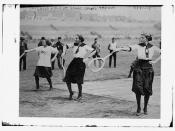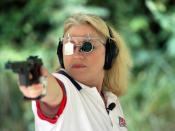Women in sport
Jane English has presented several arguments related to sexual equality in athletics. Crucial to these arguments is the distinction between basic and scarce athletic benefits. Basic benefits are those to which everyone has an equal right; scarce benefits are those to which everyone does not have an equal right. Examples of basic benefits are health, the self-respect to be gained from doing one's best, learning cooperation by working with team-mates and battling against opponents, and the opportunity to improve one's skill. Examples of scarce benefits are fame and fortune. It is clear that basic benefits, at least in theory, can be available to all and are achievable by all; scarce benefits by their very nature cannot be attained by all
In Ethics in Sport 2001, Raymond Bellioti puts across an argument regarding women in sports, and their demand for equal coverage and prize money. One of the first points that he makes is that; "Members of disadvantaged groups identify strongly with each other's successes and failures".
Although this is undeniably the case, the fact that he has singled out only the disadvantaged groups suggests that he does not believe this to be the case for other groups within sport, namely elite male competitors. In any sport and at any level, there is an empathetic feeling between competitors. Regardless of the extent of the rewards, the identity issue will be present.
Bellioti makes the point that the fact that women do not receive equal fame and fortune as a result of their achievements, should not lead to the conclusion that women are naturally inferior athletes or indeed inferior people. Resoundingly, women should by no means be perceived as inferior people; however it has been argued that by some that women are indeed inferior, in an athletic sense. Naturally,


